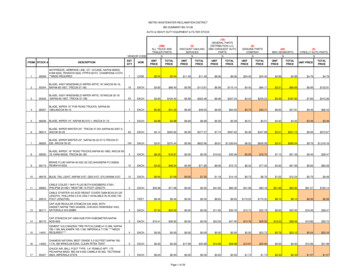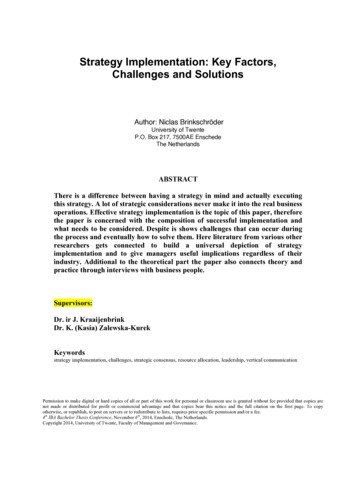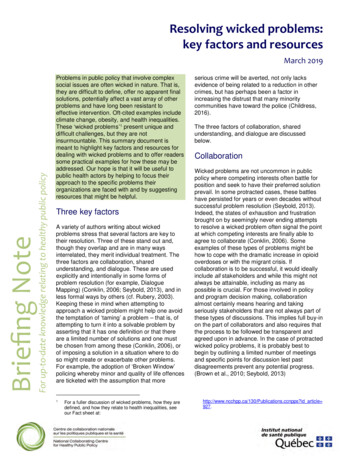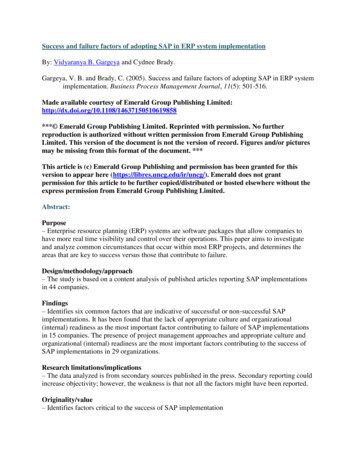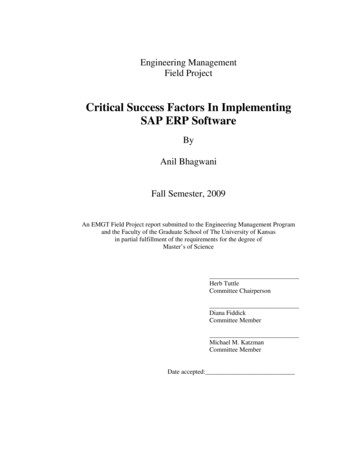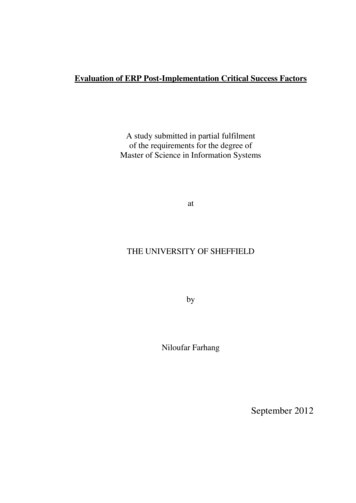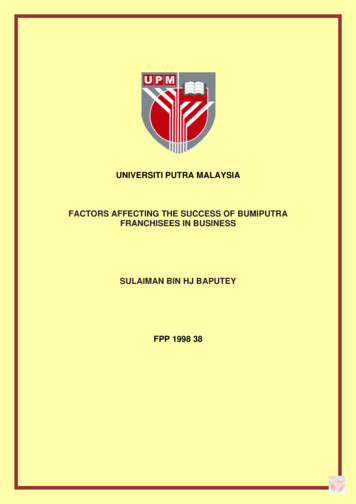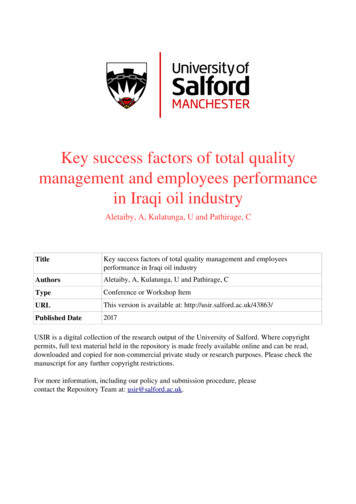
Transcription
Key success factors of total qualitymanagement and employees performancein Iraqi oil industryAletaiby, A, Kulatunga, U and Pathirage, CTitleKey success factors of total quality management and employeesperformance in Iraqi oil industryAuthorsAletaiby, A, Kulatunga, U and Pathirage, CTypeConference or Workshop ItemURLThis version is available at: http://usir.salford.ac.uk/43863/Published Date2017USIR is a digital collection of the research output of the University of Salford. Where copyrightpermits, full text material held in the repository is made freely available online and can be read,downloaded and copied for non commercial private study or research purposes. Please check themanuscript for any further copyright restrictions.For more information, including our policy and submission procedure, pleasecontact the Repository Team at: usir@salford.ac.uk.
ID 137KEY SUCCESS FACTORS OF TOTAL QUALITY MANAGEMENTAND EMPLOYEES PERFORMANCE IN IRAQI OIL INDUSTRYA. Aletaiby, U. Kulatunga and C. PathirageSchool of the Built Environment, University of Salford, Salford, M5 4WT, UKEmail: a.a.aletaiby@edu.salford.ac.ukAbstract: In times of the business world, under globalisation and overlapping variables, theconcept of total quality management (TQM) as a philosophy to excel organisationalperformance is growing in significance. Many companies across the globe including oil andgas companies employ TQM, as its effectiveness has been observed to improve businessperformance in various aspects. The oil industry has a critical impact on the economy of Iraqas it represents the backbone and the major source of income to this country. The main aim ofthis paper is to developing a conceptual framework to improve the employee performance inIraqi oil industry through applying key success factors of TQM. Therefore, the researcherconducted an extensive literature review on the TQM studies in order to identify and evaluatethe key success factors of TQM in addition to the key measures of employee performance. Theresults of this paper find that there are nine TQM key factors: top management commitment,customer focus, continuous improvement, process management, training and developing,quality culture, employee empowerment and participation and communication. Moreover,three measures of employee performance have been investigated in this study: employeesatisfaction and improving work climate. The main finding of this paper is a proposedconceptual framework which contains key success factors of TQM and their impact onemployee performance. The proposed framework validate by interviewing ten decision makersin one of the most significant oil company in Iraq which is Iraqi oil company.Keywords: Total Quality Management, TQM Key Factors, Employee Performance, Iraqi OilIndustry.1. INTRODUCTIONIn recent times, companies face continuous and massive changes in its business environment.Technological and economic levels are affected by the rapid development of globalisation,information technology, increased competition and modern management approaches. Thus,maintaining successes has become more challenging as companies face an environment thathas become more complex, dynamic and challenging (Al-Khalifa & Aspinwall, 2001). TQMconsidered being one of the most long-lasting management innovations in the recent decades.TQM views an organisation as an integrated process that should be constantly improved bymerging employees’ knowledge and experience in order to attain organisational aims. It mustbe accomplished by management and employees in all company's activities (Hashmi 2004).Successful implementation of TQM assist the companies to run their activities moreefficiently. It has been suggested that implemented TQM leads to better organisationalperformance (Nilsson et al, 2001). Abusa & Gibson (2013) argued that many multi-nationalcompanies especially Oil Company have already boosted up their organisational performanceby effectively utilising the practices of TQM. The organisational performance is achieved bykey indicators including customer performance, employee performance, financialperformance, operational performance and environmental performance. However, accordingto Alsaidi (2014), the success to achieve TQM standards in many oil companies in the MiddleEast still lower than expected. Brah et al., (2002) stated within the context of TQM668
implementation, there is increasing recognition of the significant role of employees inachieving the success.In Iraq, the oil industry plays a critical role in the economy as it represents the major sourceof income for the economy. However, Iraqi oil companies are at the very initial stage of TQMdevelopment, despite its benefits and results on employee performance, even the qualitymanagement and developing performance was only developed in Iraq in early 2008 (IMOO,2013).From what has been mentioned previously, what is the impact of TQM implementation onthe employee performance and does TQM practices and key factors provide benefit for theemployees? This paper is seeking to enhance the literature review through highlighting therelationship between the key success factors of TQM and the employee performance in thecontext of the oil industry.2. RESEARCH METHODOLOGYThis paper depends on conducting an extensive literature review as a method to identify therelevant book, journals, articles websites that describe, examine and concentrate on the keysuccess factors of TQM in addition to the measures and indicators of organisationalperformance in general and employee performance in particular. A comprehensive literaturesearch based on the keywords search method was conducted using the search engines likeSolar, Scopus and Google Scholar. The keywords searched for “TQM”, “oil industry”,“employee performance”3. TOTAL QUALITY MANAGEMENTTQM is a term that was initially coined by the Department of Defence in the United States(Evans & Lindsay, 2001). TQM is considered as a new managerial concept; it took place inthe USA in the early 1980s as a result of poor manufacturing product quality compared withtheir Japanese competitors (Talha, 2004). By 1982, American corporations were in a nearpanic due to the high productivity of Japanese companies who spread their productsthroughout America and they gained a high market share as a result of low labour costs inJapan, the Japanese work ethic, conflict between labour and management and burdensomegovernment regulations in the USA (Mele and Colurcio, 2006). The spread of the TQMphilosophy is expected to be accompanied by greater sophistication in the implementation oftools and techniques and extra emphasis on people. The process will also extend beyond theorganisation to include partnerships with suppliers and customers. Activities will bereoriented to focus on the internal and external customer (Dale et al., 2013). By the 1990squality programmes for productivity and innovation had been intensified to respond to new,often harsh, world conditions and contingencies. Quality management provided the basis for“a new approach in business management for the turn-around” (Mangelsdorf, 1999). Lau &Tang (2009) mention that the complex and dynamic technology, resources and taskenvironment, and customer expectations and orientation are the primary factors behindadopting TQM in today's organisations. They add that TQM has shifted management styleaway from traditional thinking in terms of process control and organisation aims to givingmore attention to the organisational culture as the essential driver of process control. TQMapproach is now seen essential to long- term survival in business and a key factor thateveryone in the company should be involved and committed from the top to the bottom of the669
organisation. The successful total – quality-managed company ensure that their goods andservices can meet their following criteria: (Harris et al., 2013)1. Be fit for purpose on consistency reliable basis.2. Delight the customer with the service that accompanies the supply of a good.3. Supply a quality of the product that is so much better than that of the competition that thecustomers want it regardless of price.Therefore, TQM can have a transforming impact on an industry that is in a state of substantialstructural change and facing increased competition by raising performance. Invariably, theimplementation of TQM by the Iraqi oil industry could result in the provision of overall highquality standard that contributes effectively to improving the entire performance.4. KEY SUCCESS FACTORSThe identification of key success factors of TQM assist the companies to understand moreregarding the dynamic and active nature of this approach. For achieving successful TQMimplementation within any company, thus, the characteristics prominent in these factorsconsider as essential elements that influence the implementation of TQM within anycompany. According to Najeh (2006), key factors there can be the production of two logicalstatements. Firstly, quality philosophers and empirical researchers. Secondly, there is noagreement observed on the sacrosanct critical factors of quality. Therefore, the majority havecited various factors that are common. For instance, leadership has always been included.Therefore, ‘near-universal’ acceptance has been expected by some of them whilst the rest aresecondary or just marginal. Communication, teamwork, training and education are someexamples of ‘nearly-universal’ quality factors. Labour-union relations are an example ofmarginal factors. Researchers such as (Flynn et al., 1994; Yasamis et al. 2002; Koh & Low2010; Kumar, et al., 2011; Hietschold et al., 2014; Neyestani and Juanzon 2016) havecontributed to the examination of the key factors of TQM implementation where they cameup with more or fewer factors but of the same ground. Forming a general conclusion fromthese studies is that, there is a range of factors which have to be considered by eachorganisation for TQM implementation process to be precise and sure. The TQM concept isenforced by key factors which differ from each other as they are determined by the specificcompany. Table 1 reveals the numerous TQM factors that can be identified as beingsignificant to the successful TQM implementation.670
Flynn etal., 1994Topmanagement supportBlack andPorter 1996people ent esignWorkforce externalmanageme resforimprovementOperationalTable 1: Comparisons of TQM key success factors Propositions by different authorsYasamis et Lewis et Koh1 and Kumar et Gherbal et Hietscholdal. 2002al., 2006Low 2010al,. 2011al., 2012et al., 2014Leadership CustomerTopManagement Communicati Humansatisfactio managemen commitment onto Resourcent tomerCustomerOrganisation teamworkfocusresourcesmanagemen satisfactionmanagementutilisation tEmployeeManageme PeopleContinuousTraining and Topempowerm ntof managemen improvemen development managemententprocessttcommitmentqualityPartnership TrainingSupplierTeamworkEmployeeprocessdevelopme andmanagemeninvolvement managementnteducationtandrecognitionInformation Manageme QualityEmployeeCultureCustomerandntinformation trainingfocusanalysiscommitme ManagemennttProjectContinuou ProcessFeedbackSuppliermanagemen smanagemenpartnershipt processimprovem tentContinuous Leadership Organizatio EffectiveTraining andimprovemenal learning onDedy et al., Neyestani &Juanzon20162016TopCustomerManagement focusLeadershipLeadershipCommunicati ionandanalysisTraining
qualityplanningQualityimprovementmeasurement rmancemeasurementimprovementand re ssociates672
An extensive review and analysis have been conducted on the above-mentioned studies byseveral industries worldwide. Based on professionals, researchers and experts findings andsupported by the writing of quality pioneers, empirical surveys, case studies and qualityawards and models, Eight factors have been identified which form the basis of the mostsignificant factors to be considered as the key success factors of TQM. According to thenature of quality management implementation within the Iraqi oil industry, the identifiedeight key factors of TQM expect to be more relevant in the Iraqi context.4.1. Top management commitmentWith respect to its vital role in implementing TQM top management commitment consideredas the initiation point in which quality activities stems from it (Hietschold et al., 2014). Topmanagement commitment represents the main driving force behind the TQM thus, it is aresponsibility to create an appropriate environment for TQM implementation. According toSeetharaman et al. (2006), an organisation cannot be transformed into a TQM if the TQMpractices have not performed in the organisation by the top management. Having said that,the essential task of the top management is to guarantee this transformation and ensure itscommitment towards the TQM activities.4.2. Customer FocusThe main factor of TQM, in accordance with Richards (2012), is customer focus. Richardsemphasizes that quality is defined by the customer but not by the organisation or the productor service manufacturer since quality is what the end user desires. Brah et al., (2002) claimsthat the success of any organization in near future would depend upon the satisfaction of itscustomers’ needs efficiently and effectively on a continuous basis. In the same regards,Zhang (2000) stress that customer focus is the extent to which an organization conti
three measures of employee performance have been investigated in this study: employee satisfaction and improving work climate. The main finding of this paper is a proposed conceptual framework which contains key success factors of TQM and their impact on employee performance. The proposed framework validate by interviewing ten decision makers in one of the most significant oil company in

